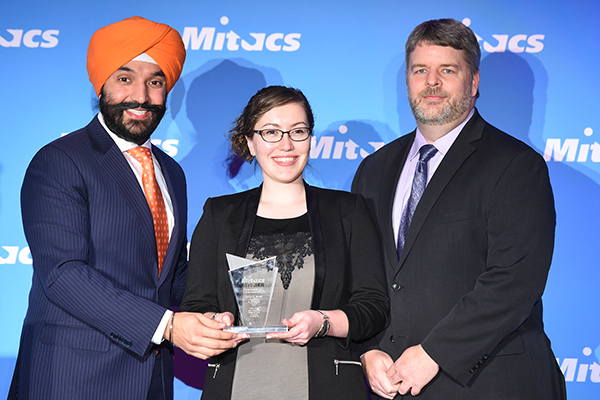Promising cancer research
November 22, 2017
Share

Queen’s PhD student Caitlin Miron was in the spotlight in Ottawa this week when she was presented with the Mitacs PhD Award for Outstanding Innovation for her work in biochemistry. Ms. Miron, a student with the Department of Chemistry, broke new ground by discovering a DNA binder that can essentially ‘switch off’ cancer cells and prevent them from spreading.
The award is given to a PhD student who has made a significant achievement in research and development innovation during Mitacs-funded research. Ms. Miron’s award is one of seven given annually by Mitacs, a national, not-for-profit organization that works with 60 universities, thousands of companies, and government to support industrial and social innovation in Canada.
Ms. Miron was presented with her award by Navdeep Bains, Minister of Innovaton, Science and Economic Development, Kristy Duncan, Minister of Science, and Alejandro Adem, Chief Executive Officer and Scientific Director of Mitacs.
Ms. Miron’s research focused on identifying a chemical compound that can bind to a specific form of DNA architecture, which has been found in cancer genes. Preliminary results show the compound can stabilize the DNA and thereby stop the cancer from spreading. This research may be useful in anticancer therapeutic agents, either alone or combined with other treatments.
“You can think about temporarily single-strand DNA as a necklace. You have a chain, which is your DNA, then you have beads that move freely along that chain until they come to a knot. That knot is a guanine quadruplex, which is an unusual form of DNA. Normally that knot can be unraveled, but if someone has put superglue on it, you can’t unknot it. What we found is essentially an excellent form of superglue,” says Ms. Miron. “We care about this in terms of anti-cancer applications because these quadruplexes often form before sequences of DNA that lead to the development of cancer. If we can stop those beads, which are the cellular machinery that’s going to process that DNA, from accessing it, we can potentially stop various forms of cancer development and metastasis. We have fairly promising results in cancer cell inhibition in this field."
Her findings, researched in collaboration with Dr. Jean-Louis Mergny at the European Institute of Chemistry and Biology in Bordeaux, France, during her Mitacs GlobalLink internship, will be published in January 2018. It is also expected to be ready for licensing by pharmaceutical companies within two to five years.
To learn more about Ms. Miron’s research and to watch a video interview with her, visit the School of Graduate Studies website.